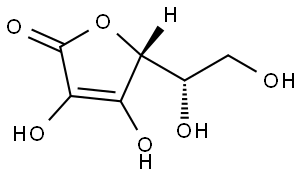L-Ascorbic acid is a naturally occurring electron donor and therefore serves as a reducing agent. It is synthesized from glucose in the liver of most mammalian species, excluding humans, non-human primates, or guinea pigs who must obtain it through dietary consumption. In humans, L-Ascorbic acid acts as an electron donor for eight different enzymes, including those related to collagen hydroxylation, carnitine synthesis (which aids in the generation of adenosine triphosphate), norepinephrine synthesis, tyrosine metabolism, and amidating peptides. L-Ascorbic acid demonstrates antioxidant activity that may be of some benefit for reducing the risk of developing chronic diseases such as cancer, cardiovascular disease, and cataracts.

